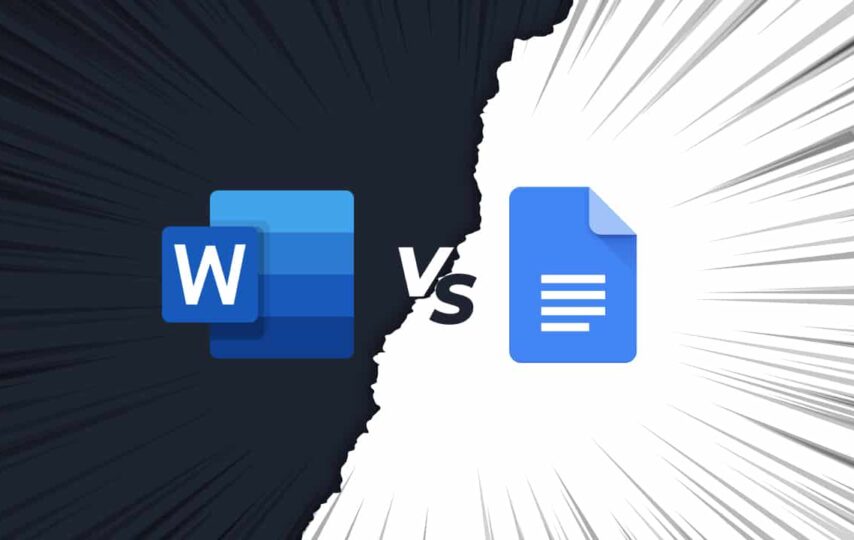Two giants stand head-to-head, vying for supremacy: Google Docs vs Word. These applications have completely transformed the manner in which we generate, modify, and cooperate on documents, presenting a wide array of functionalities aimed at simplifying our writing procedures. Within this piece, we set forth on an all-encompassing investigation into the ongoing discussion between Google Docs vs Word, digging into their respective advantages, drawbacks, attributes, and the situations in which each excels.
The Rise of Google Docs and Microsoft Word
Google Docs, a part of the Google Workspace suite, and Microsoft Word, a component of the Microsoft Office suite, have redefined how we approach document creation. Both platforms boast robust word processing capabilities, but they cater to different user needs and preferences.
Google Docs: Collaborative Simplicity
Google Docs emerged as a pioneer in cloud-based document editing. Its seamless collaboration features allow multiple users to edit the same document in real-time, breaking down geographical barriers and making remote collaboration effortless. Its simplicity and intuitive interface make it an appealing choice for both individual users and teams.
Microsoft Word: The Powerhouse of Features
Microsoft Word, on the other hand, is a veteran in the word processing arena. Its rich history has led to the accumulation of an extensive set of features, ranging from advanced formatting options to intricate design elements. Word is renowned for its flexibility, catering to the needs of professionals, educators, and writers seeking intricate document customization.
Feature Face-Off: Google Docs vs. Microsoft Word
1. Collaboration
Google Docs: The crown jewel of Google Docs lies in its collaborative prowess. Real-time editing, commenting, and suggesting features make it ideal for projects requiring constant interaction among team members or co-authors. Changes are synchronized instantaneously, fostering efficient teamwork.
Microsoft Word: Although Word has made strides in collaboration with real-time co-authoring features, it doesn’t quite match the seamlessness of Google Docs. Although collaboration is feasible through cloud storage options such as OneDrive, it doesn’t match the seamless fluidity of Google’s method.
2. Accessibility
Google Docs: Prioritizes accessibility at the heart of its design principles. Operating on the web, it guarantees compatibility across various devices without necessitating any software installation. This accessibility is a boon for users who frequently switch between devices or work on public computers.
Microsoft Word: While Microsoft has made efforts to offer web-based versions of Word, its primary functionality often relies on the installed desktop application. This can be limiting for users who require flexibility in accessing their documents.
3. Formatting and Design
Google Docs: Google Docs prioritizes simplicity and ease of use, which sometimes comes at the cost of intricate formatting options. While it offers essential formatting tools, users seeking sophisticated document layouts might find Google Docs slightly lacking.
Microsoft Word: Word reigns supreme in terms of formatting and design capabilities. With a vast array of fonts, styles, templates, and layout options, it caters to users who demand precision and customization in their documents.
4. Offline Access
Google Docs: Google Docs allows users to access their documents offline using browser extensions and mobile apps. Nevertheless, the integration of this feature is not as flawless as anticipated, and specific advanced functionalities might encounter limitations when operating in offline mode.
Microsoft Word: Microsoft Word’s desktop application offers robust offline functionality, making it a dependable choice for users who frequently find themselves without an internet connection. Changes made offline are synced when the user goes online.
Choosing the Right Tool: Context Matters
The decision between Google Docs and Microsoft Word relies on individual requirements, work processes, and inclinations. Reflect on the subsequent scenarios to aid you in arriving at a well-informed choice:
- Collaboration-Centric Work: If your projects involve intensive collaboration with remote teams, Google Docs is the frontrunner. Its real-time editing and commenting features foster seamless teamwork.
- Advanced Formatting and Design: If your documents demand intricate layouts, meticulous formatting, and extensive design elements, Microsoft Word’s extensive feature set is your ally.
- Simplicity and Accessibility: For users who prioritize accessibility and the ability to work across devices without installations, Google Docs offers a streamlined and intuitive platform.
- Offline Dependability: If your work often takes you to places with limited or no internet access, Microsoft Word’s robust offline functionality ensures that your productivity remains uninterrupted.
Ultimately, the discourse surrounding Google Docs versus Microsoft Word doesn’t boil down to one tool being unequivocally better than the other. These platforms address distinct user requirements and preferences, with each excelling within its particular domain. The rise of cloud-based collaboration and the evolution of document processing have given us a choice between Google’s collaborative simplicity and Microsoft’s powerhouse of features. As technology continues to advance, we can expect these platforms to refine their offerings, further blurring the lines between the two and enriching the world of word processing for all users.








